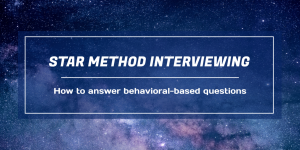STAR Method Interviewing
- morgtre
- Mar 11, 2020
- 4 min read

Behavior-Based Interviewing
Behavioral-based interviewing is a big term that just means that interview answers should be framed as stories. Hiring managers know that you can tell them whatever they want to hear. For example, you can say, “I’m hard-working and work well with others,” but your potential employer wants you to prove it with specific examples.
STAR Method Components
One fail-safe behavioral interviewing technique is called the STAR format. STAR stands for Situation, Task, Action, and Result, which are the steps that each story/ answer should follow.
Situation Set the stage of the story. You don’t have to describe your entire life leading up to the event, but give enough background so that a complete outsider can follow the context. Don’t forget to explain the problem you faced.
“When I was an HR director at ABC Company, we got an important new client that needed 500 pieces completed in two weeks. At the time, our team averaged just 50 pieces a week.”“ABC Dresses was a brand-new wedding dress vendor that was operated entirely by the designer. As part of a team of interns, the designer wanted us to help spread the word about her dresses.”
Task Establish the goal you were trying to reach. Your task should not be a job duty that you routinely performed. Instead, use a specific event or project.
“In order to fulfill in time, I needed to hire at least four new writers before the beginning of the project.”“Our team decided that a social media campaign was the best way to spread brand awareness. Our goal was to reach 1000 followers on each of four platforms by the end of the three-month internship.”
Action Describe what you did or how you achieved the goal. Make sure to focus on your efforts, not the efforts of a team. Help the interviewer see how your brain works when faced with a challenge.
“The first thing I did was make a priority list so that I didn’t neglect my other duties during the hiring process. Then, I deployed the job openings on all avenues I thought would be effective. Additionally, I asked my coworkers to share the openings with anyone that might be a fit. Finally, I organized group interviews to speed up the initial vetting process.”“My job was to conduct market research so we could target the right audience. I identified an appropriate sample group: a nearby college campus. I developed a survey that was short and easy, yet specific and actionable. I set up a booth at the food court for high-visibility to students who had a minute to spare during their lunch. I also brought chocolate as incentives.”
Results Tell what came of your efforts in as quantitative terms as possible.
“Not only did we fulfill our clients’ order, but we also delivered with only a .01% error rate, received five even larger orders from the client in the future, and added four new high-performing writers to our team.”“With the results of my survey, we were able to align our target audience with that of online influencers and interest groups who we partnered with. We reached our goal one week before the end of the internship. The growth velocity we started continued and after another three months, sales increased by five times.”
Tips
Listen carefully to the questionAsk for clarification if you’re not sure what is being askedAnswer all parts of the questionTell a storyQuantify your resultsUse examples from past internships, classes, team involvements, community service, or work experiencePrepare multiple answers ahead of time so you don’t draw a blank during the interview
Sample Questions
Driving for results: Tell us about a time when there was an obstacle preventing you from successfully completing a project. How did you get around the obstacle to obtain success?Innovative Solutions: Our company is always looking for innovative people who can achieve solutions. Tell us about a time that required a unique solution and how you achieved it.Customer Focus: Give us an example of how you took negative customer feedback and were able to achieve a positive result.Coaching: From time to time we all work with peers who are not performing or doing a good job. How have you handled that in the past?Building trust internally: Tell us about a time where you have worked with an individual who had different opinions from your own and how you handled that.Job satisfaction: Describe an occasion when you had either many or not many opportunities for creativity in your work. How satisfied did that make you? Why? What was the job that made you the most satisfied or dissatisfied with your work? What made it most satisfying or dissatisfying?Pride In One’s Work: In your job at xxxx, what was your definition of a job well done? Do you feel you did a good job? How could you tell? Provide an example. What were the standards for success in your position at xxxx? How did you meet the requirements? Do you have a recent example you can describe? Provide an example of a situation where you knew that a process was being done poorly. What did you do to correct it? How did that turn out?Making Decisions: Describe an instance when you had to analyze and interpret financial or numerical data. Describe a recent problem you discovered in your job at xxxx. What information did you use to identify the problem? Tell me about a complicated problem you encountered at work. What did you do to get a better understanding of the problem?Teamwork: Provide a situation where brainstorming produced differing or conflicting ideas with others. How did the goal get accomplished? Describe a time when you worked with a coworker to come up with roles and responsibilities. Have you ever helped someone come up with an idea? Give an example.Self Awareness: Tell me what areas you excel technically? What technical areas are your weaknesses that you need to improve?



Comments